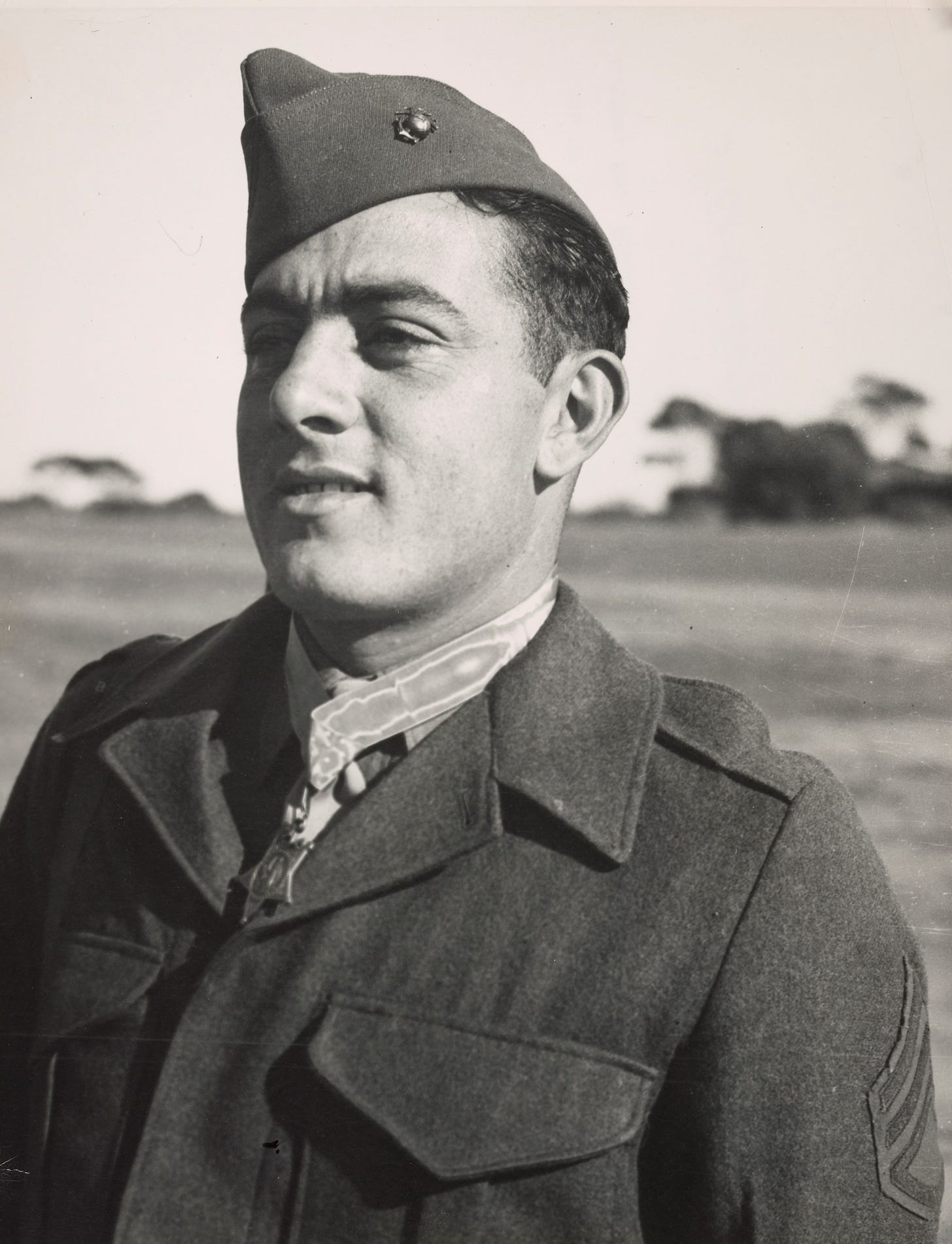American hero John Basilone killed at Iwo Jima
Among the approximately 300,000 Americans killed in action in World War II, John Basilone’s death on Feb. 19, 1945 holds a unique place in the history of the conflict.
It was exceedingly rare that the loss of any individual service member — particularly an enlisted man — made the news across the country. Basilone’s did, because he was no ordinary sergeant.
As the first enlisted Marine to earn the Medal of Honor in the war, for his heroic actions on Guadalcanal in October 1942, Basilone became something of a reluctant celebrity.
After news of the decoration went public in the summer of 1943, he returned home that September to embark on a war bond tour, which was standard practice for well-publicized heroes during the war. He visited New York Mayor Fiorello La Guardia for a photo op designed to boost war bond sales, and his hometown of Raritan, New Jersey, threw a parade in his honor that drew an estimated crowd of 50,000. He also traveled to war plants to speak to workers about how important their efforts were in keeping the troops ready to fight.
As he did his part, Basilone made it clear he wanted to return to the front, but the Marine Corps believed he was more valuable in public relations than on the battlefield. Basilone finally prevailed, and in January 1944 he traveled to Camp Pendleton in California to join the newly formed 5th Marine Division, where he was soon promoted to gunnery sergeant.
His prime motivation was ensuring he was among the Marines who recaptured Manila, where he had served in the army in the mid 1930s. He talked about the experience so often that his fellow Marines had nicknamed him ‘Manila John.’
That February in San Diego, Basilone met Sgt. Lena Riggi of the Marine Corps Women’s Reserve, and the two married on July 10. On Aug. 12, Basilone and his men shipped out to Hawaii, where they would train for more than five months before heading farther west, to Saipan. That would be their jumping-off point to attack an island called Iwo Jima.
Shortly after 9 a.m. on Feb. 19, Basilone led C Company of the 1st Battalion, 27th Marine Regiment, ashore at Iwo. For at least 90 minutes, he braved murderous fire as he led and directed attacks on Japanese positions. Hugh Ambrose offers an excellent reconstruction in The Pacific, and his research determined Basilone ultimately suffered multiple bullet wounds and was killed by mortar shrapnel as he advanced on an airfield late that morning. He was 28 years old.
When cleared by censorship weeks later, the press accounts of Basilone’s death were vague. The lead of the Associated Press account by Hamilton W. Faron that appeared in most newspapers on March 8 said Basilone “was killed by Japanese artillery fire on the beach.”
The second paragraph said he “was leading his machine gun platoon through a heavy artillery barrage when he was felled on the black sands. He and several of his men were caught by the Japanese fire soon after they hit the beach in the opening assault.”
A dispatch by Marine Corps combat correspondent Staff Sgt. Henry Giniger released the same day was apparently more accurate, saying Basilone had been fatally wounded “a few hours after he hit the Iwo beach.”
Either way, the bottom line was the same. One of America’s best-known fighting men had fallen after volunteering — insisting, really — to return to the front lines.
The March 9 New York Times included an editorial titled “John Basilone, Hero.” It concluded with the following passage:
Being a marine fighting man, and therefore a realist, Sergeant Basilone must have known in his heart that his luck wouldn’t last forever. Yet he chose to return to battle. When it has needed them the United States always has had men like him. The tragedy of their deaths is that it ever should have become necessary for their country to ask them to make the sacrifices they have made and must continue to make until the war is won.
The finest monument they could have would be an enduring resolve by all of us to this time fashion an enduring peace. If that had been done the year John Basilone was born he would not have had to die last month on an alien beach so far from home.




